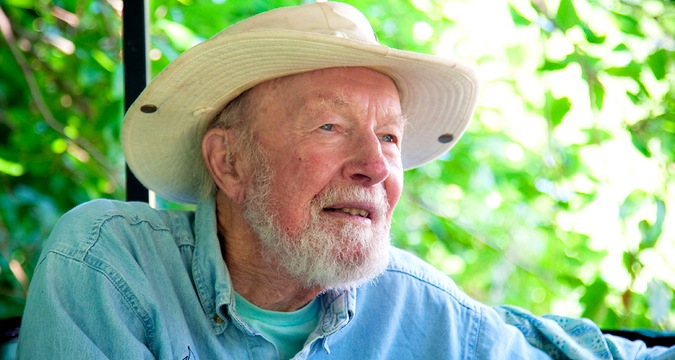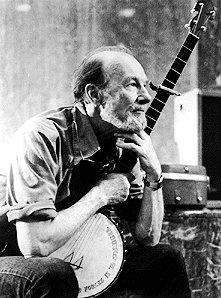RIP Pete Seeger, Humble Giant of the Folkways

The passing last week of seminal folk revivalist, labor organizer, five-string banjo master, and champion-of-community Pete Seeger hit the folk community hard, and no wonder: though the 94 year old legend had been in failing health for a while, I think some of us just felt like Seeger would be here forever, the last scion of an ethnomusical era marching ever onward in the name of change and children.
But even as we watched grandson Tao Rodriguez Seeger become his constant companion and voice over the last few fragile years of Pete’s life, we knew: Seeger’s voice will never truly die. Children of several generations, from my own to my mother, who once used Seeger’s songs as a vehicle for planting the seeds of peace and justice in both myself and in the inner city classrooms of New York City, recognize Pete’s songs, and his long-standing contribution to social, environmental, and political change though the act of singing them loud and proud. And we will sing them for a long, long time, and some of the time – maybe even most of the time – we won’t be thinking about him, but each other, just as Seeger would have wanted it to be.
And you know all this, I think. Or you wouldn’t be here.
Pete Seeger’s impact on the modern folk canon is inherent, and deeply ingrained; there is something so obvious about his legacy that it seems almost redundant to go into it on the page. And it’s hard to imagine anyone genuinely untouched by the compassionate, tireless work in the name of human dignity, empowerment, and awareness which Seeger considered his life’s work through sixty years as a recording artist and activist. Yet one trope, I think, bears note here regardless – one which befits a cover blog who aims to explore the nexuses in song which fuel folk itself. For although he has been justly feted for his politics and song on the web in the days since his passing, Seeger’s practice of the folkways became a prototype for the folk revival that followed, and continues to spread today.
 The son of an ethnomusicologist and a true believer in folk as a mechanism for tying past to future, perhaps more than any artist in history, Seeger lived folk song as if it truly did belong to the community for which it speaks. And although this practice was occasionally dismissed as a form of cultural disrespect, it is this, as much as his songs, which may well prove to be the longest lasting of his influence.
The son of an ethnomusicologist and a true believer in folk as a mechanism for tying past to future, perhaps more than any artist in history, Seeger lived folk song as if it truly did belong to the community for which it speaks. And although this practice was occasionally dismissed as a form of cultural disrespect, it is this, as much as his songs, which may well prove to be the longest lasting of his influence.
Though many songs list his name as whole or partial composer and arranger, and though his sense of singability and play were unparalleled in the history of modern social justice song, like Dylan after him, Seeger didn’t so much write and perform many of his most popular songs as he did translate them for his times. Several of his best known, from Wimowe to Turn, Turn Turn to We Shall Overcome, were created from existing hymns and folk melodies from around the world, found fragments shaped towards sociopolitical aims and sing-along user-friendliness by an earnest master. And as others have taken on the songs Seeger passed forward, versions drift, as well, with new verses added and new words sung, in the spirit of communal ownership that the statesman of folk-as-justice so exemplified.
Those who have suggested that Seeger was a theft of song from the third world cultures and underclasses he so loved both unfairly denigrate a man who loved all people and, simultaneously, miss the point of how the folk tradition truly works at its most powerful and honest. And if losing Seeger hurts so much, it is because his may well have been the most powerful, honest voice that so many of us will ever have the pleasure to meet, and love, and sing with.
Paying tribute to Seeger’s songbook, then, requires covering love – specifically, that broad sense of version ownership much like that of the oral tradition, which pays tribute to the teacher while acknowledging the timeless cultural history behind the songs. Instead of trying to parse the margins of copyright and origination, then, here’s a set of personal favorites with a much simpler organizing principle: songs which other folk artists of a certain political bent learned from or associate with Pete Seeger himself, regardless of authorship, and recorded in deliberate tribute to this long-standing folk icon.
REMEMBERING PETE SEEGER [download here!]
- The Mammals: Quite Early Morning [2004]
- Bruce Cockburn: Turn, Turn, Turn [1998]
- Richard Shindell: Waist Deep in the Big Muddy [2004]
- Ani DiFranco: Which Side Are You On [2011]
- Sarah Lee Guthrie and Johnny Irion: Dr. King [2005]
- Elizabeth Mitchell: Little Bird, Little Bird [2006]
- Tish Hinojosa: Festival Of Flowers [1998]
- Kate & Anna McGarrigle: Little Boxes (Petites Boites) [2004]
- Eric Bibb: Michael Row the Boat Ashore [2004]
- Pat Flynn: If I Had A Hammer [2004]
- Tony Trischka & Jennifer Kimball: Jesu, Joy of Man’s Desiring [2003]
- Leo Kottke & Mike Gordon: Living In The Country [2005]
- Blue Moose and the Unbuttoned Zippers: Kisses Sweeter Than Wine [2010]
- Billy Bragg & Eliza Carthy: My Father’s Mansions [1998]
- Indigo Girls: Letter to Eve [1998]
- Folk Family Robinson: Reuben James [2007]
- Joan Baez: Sagt Mir Wo Die Blumen Sind? [1965]
- Ladysmith Black Mambazo: The Lion Sleeps Tonight [1988]
- Luka Bloom: The Water Is Wide [2004]
- Bruce Springsteen: Pay Me My Money Down [2006]
- Holly Near and Ronnie Gilbert: Precious Friend [2003]
Looking for more great Pete Seeger coverage? There are some great tributes out there, most notably the three sets which the activist-founded, socially conscious folklabel Appleseed Recordings has released in a scant decade of existence. Each is represented in the set list above, but I’m especially enamored of double-disc first release Where Have All The Flowers Gone: The Songs Of Pete Seeger, which in addition to Bruce Cockburn, Indigo Girls, Tish Hinojosa, and Billy Bragg, includes a veritable who’s who of big-name inheritors of the activist folkmantle, from Springsteen to Richie Havens to Odetta. Head over for Seeger catalog gems, coverage, and great albums from other folksingers carrying the torch into the 21st century!
Category: Pete Seeger, RIP One comment »
January 17th, 2015 at 9:25 pm
Wonderful wonderful wonderful. Great share
Regards
Rhod